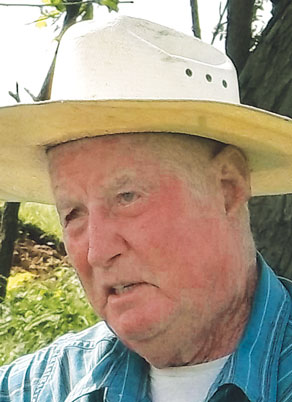
Bobby Doyle and his wife, Jane, own 238 acres in Stilwell, Okla. “I have 100 momma cows and babies, five in service bulls, 24 for sale bulls ready for service in November of this year. I sell nothing but registered Angus bulls,” Mr. Doyle said. He keeps meticulous records for all his cattle. “I don’t release records for any females that I sell. They are all sold as commercial breeders if I sell any at all,” he said. “I’m not such a stickler for bloodline but I am very critical about conformation. I look for a lot of hind quarter. I look for a lot of meat. I want to see a wide top line. I want to see a straight bottom line and straight top line. The only one I sell is one that goes bad or one that does not meet my conformation specifications.
“I only keep my bulls for not more than two breeding seasons. In order to sell registered Angus bulls to a repeat customer you must have new bloodlines,” he said. “When a bull gets to be 4 to 5 years old; number one they are too heavy for the heifers, number two they are probably related to that heifer. So by rotating those bulls, I can keep all of my heifers without being concerned about inbreeding,” he continued. “Now sometimes line breeding is very beneficial but a breeder must know what they are doing and be very careful in doing line breeding.”
Bobby has nine springs on his property. “I have a little over 10,000 feet of underground water piping that I pump water tthrough for livestock water and also for watering crops. I’ve developed six reservoirs that are all spring fed,” he said. “On the back 80 where the spring feeds out of the bluff, I have developed a cattle watering station. My cattle can walk up, stick their head through a pipe rack and drink water without standing in it, urinating in it and depositing feces, etc. That helps control multiple things like disease, foot rot and infection,” he said. His watering system also keeps wildlife from getting into his cattle’s water supply further controlling disease.
“Diversification is necessary for most farm operations because they cannot be self supported. I produce about an acre and a half to 2 acres of strawberries per year. They are all plasticulture now.” Bobby also produces asparagus.
Bobby said his farm is supported by teacher retirement and social security checks. “I taught school for 25 years. I was the principle at the Stilwell High School. I spent the last 21 years at Stilwell teaching vocational agriculture and in the administrative position. My love was always teaching agriculture,” he said. “I grew up on a farm. I bought my first farm when I was just past 18. I farmed for 16 years and got a saw log on me and pulled my back in two. I had to do something else so I went back to college and got a degree in vocational agriculture when I was 33 years old,” he added. “I started teaching out of Oktaha south of Muskogee, Okla. I was there two years. Then I moved to Stilwell and taught vocational agriculture. I went into administration for three years and then retired at 25 years.”
“My dad and mother were from Arkansas, the West Fork region. They came to Oklahoma in 1923 and bought land in England Holler about 9 miles northwest of here,” he said. “Jane is my second wife. We have four children the oldest of which died in a car wreck. We had two boys and two girls.” Bobby has five grandchildren and nine great grandchildren. “My dad and mother left the accomplishment. He died at 96. Mother died at 89. When dad passed away; he left 10 children, 37 grandchildren, 83 great grand children and five great great grandchildren. He left a legacy. I’m not going to match it. Dad obeyed the Bible. He went out and tried to populate the earth. I plan to live to 100.
“Dad had five brothers. Four of them stayed in the farming business as well as dad. Five of my brothers are and were farmers. Dad taught us well,” he said. “He taught us how to work and he taught how to manage. Each and every one of us has their own farm operation. My oldest son taught his two children well because both of them are involved in farming.”
Bobby speaks of a survey both he and his brother gave high school students while they were principles. “My brother and I ran a survey. We asked high school seniors ‘should a business reap a profit at the expense of the consumer?’” he said. “Ninety eight percent answered no. Our economic system is not taught in our schools. How does a product go from here to the consumer and what cost is there involved in that product to move them? Everybody needs to know how to produce food.”







